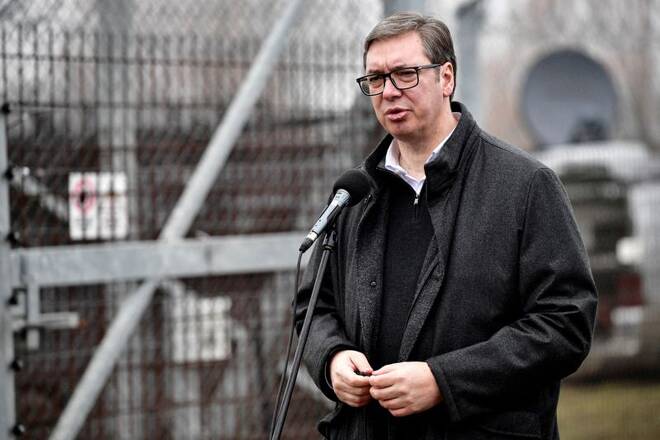Advertisement
Advertisement
NATO declines Serbia’s request to deploy its troops in Kosovo
By:
BELGRADE (Reuters) - NATO's mission in Kosovo, KFOR, has declined a Serbian government request to send up to 1,000 police and army personnel to Kosovo following a spate of clashes between Serbs and Kosovo authorities, President Aleksandar Vucic said on Sunday.
By Fatos Bytyci
SHTERPCE, Kosovo (Reuters) -NATO’s mission in Kosovo, KFOR, has declined a Serbian government request to send up to 1,000 police and army personnel to Kosovo after clashes between Serbs and the Kosovo authorities, President Aleksandar Vucic said on Sunday.
Serbia’s former province of Kosovo declared independence in 2008 following the 1998-1999 war during which NATO bombed rump-Yugoslavia, comprising Serbia and Montenegro, to protect Albanian-majority Kosovo.
“They (KFOR) replied they consider that there is no need for the return of the Serbian army to Kosovo … citing the United Nations resolution approving their mandate in Kosovo,” Serbia’s Vucic said in an interview with the private Pink television.
Last month, for the first time since the end of the war, Serbia requested to deploy troops in Kosovo in response to clashes between Kosovo authorities and Serbs in the northern region where they constitute a majority.
The U. N. Security Council resolution says Serbia may be allowed, if approved by KFOR, to station its personnel at border crossings, Orthodox Christian religious sites and areas with Serb majorities.
Vucic criticised KFOR for informing Serbia of its decision on the eve of the Christian Orthodox Christmas, after Kosovo police arrested an off-duty soldier suspected of shooting and wounding two young Serbs near the southern town of Shterpce.
Police said both victims, aged 11 and 21, were taken to hospital and their injuries were not life threatening.
Kosovo authorities condemned the incident, which has inflamed tensions.
On Sunday, a few thousands Serbs protested peacefully in Shterpce against what they called “violence against Serbs”.
Goran Rakic, the head of the Serb List, which is the main Serb party in Kosovo, accused Kosovo Prime Minister Albin Kurti of trying to drive out Serbs.
“His goal is to create such conditions so that Serbs leave their homes,” Rakic told the crowd. “My message is that we must not surrender.”
Serbian media reported that another young man was allegedly attacked and beaten up by a group of Albanians early on Saturday, while media in Pristina reported that a Kosovo bus going to Germany through Serbia was attacked and its windscreen broken with rocks late that same day.
International organisations condemned the attacks, expected to deepen mistrust between majority ethnic Albanians and around 100,000 ethnic Serbs that live in Kosovo. Half of them live in the north and most refuse to recognise Kosovo’s independence.
(Additional reporting and writing by Daria Sito-Sucic in Sarajevo; Editing by Emelia Sithole-Matarise and Barbara Lewis)
About the Author
Reuterscontributor
Reuters, the news and media division of Thomson Reuters, is the world’s largest international multimedia news provider reaching more than one billion people every day. Reuters provides trusted business, financial, national, and international news to professionals via Thomson Reuters desktops, the world's media organizations, and directly to consumers at Reuters.com and via Reuters TV. Learn more about Thomson Reuters products:
Latest news and analysis
Advertisement
